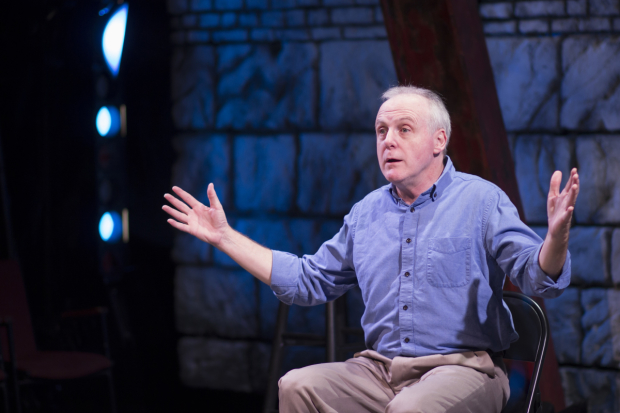
(© Katharine Burkhart/Katharine Burkhart Designs)
A man stands alone in the black box space at New Rep Theatre, the audience seated around him. The actor, here played by David Bryan Jackson, has taken the role of playwright David Hare, author of Via Dolorosa, a monologue about his trip to Israel. Hare was so moved and confused by the roiling of his ideas and emotions that he could not write a conventional play. Rather, he turned to the least ornamental form of theatrical performance, the monologue, to convey to the audience just how deeply he was affected his experience.
The 90-minute, no-intermission piece is a tour de force by Jackson and a riveting torrent of words about a tiny country with intractable problems that seems to dominate the daily headlines, despite its distance from the West. Two groups — the Israelis and the Palestinians — are in constant battle over a few narrow miles of land. They have a shared history that reaches back to the first few chapters of the Bible, when Cain slew Abel. The irony is that this country is the birthplace of three of the major world religions: Judaism, Christianity, and Islam, with Jerusalem being the Holy City for each of them.
The arc of "Via Dolorosa" is simple: The actor relates the story of his journey to (and through) Israel. He starts at Gatwick Airport, where the attendant roars with laughter when he says he is going to Tel Aviv. "What is she laughing at?" he wonders.
Like a tour guide, Hare takes us first to the Jewish neighborhoods, and then to Gaza and Ramallah. As he goes from home to village to settlement, he transforms from the playwright into the various persons he meets along the way. Although this is a one-man show, there are around 20 different characters in the play, including the Israeli theater director Eran Baniel who staged the famous production of Romeo and Juliet, in which the Palestinians played the Capulets and the Jews were the Montagues. "In this production, the Capulets really hated the Montagues," Baniel tells him.
Hare drives to a settlement in the Arab territories where two former Americans, Danny and Sarah Weiss, burn with passion for their right to live on this land that was "stolen by conquest" as Hare puts it. Later, he will meet Benni Menachem, a member of the Knesset, who explains, "This (land) is ours. We are crippled without it," and says they will never give it up. When Hare is taken to Gaza, he sees the revered Arab politician, Haider Abdel Shafi, who hates Arafat for his corruption, and in Ramallah, which is vastly different from the "desolation" of Gaza, he meets the clever Muna Khlefi and Arab historian Albert Aghazerian.
As playwright, Jackson changes from tour leader into these different characters, internalizing each one's personal opinions along with his or her external aspects of posture, gestures, and voice. His performance is a measured one, mirroring the playwright's distancing himself from the contradictions, as well as his cool intelligence. After he walks the Via Dolorosa in Jerusalem to the Church of the Holy Sepulchre, another dispute (but within Christianity), he is shaken by the enormity of Yad Vashem, the museum of the Holocaust. One more encounter brings him to the "flaming red firebrand of the Rabin government," Shulamit Aloni, before he returns to the airport. Hare ends the play back in England, on his doorstep in Hampstead Heath.
The title Via Dolorosa refers to Christ's progression to Calvary, but is also a metaphor for the contemporary elusive search for peace. To his credit, Hare does not judge who is right, and whether God's promises to Abraham and King David remain legally valid in the 21st century. Rather, he comes out troubled like the rest of us, and deeply aware of the human failings of pride, anger, and self-interest on all sides in this compelling and personal solo drama.









